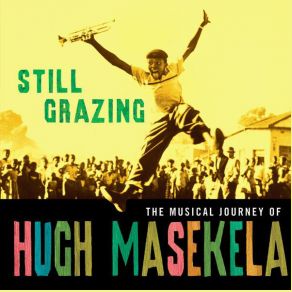Still Grazing
Download links and information about Still Grazing by Hugh Masekela. This album was released in 2004 and it belongs to Jazz, Crossover Jazz genres. It contains 11 tracks with total duration of 59:37 minutes.

|
|
|---|---|
| Artist: | Hugh Masekela |
| Release date: | 2004 |
| Genre: | Jazz, Crossover Jazz |
| Tracks: | 11 |
| Duration: | 59:37 |
| Buy it NOW at: | |
| Buy on iTunes $4.99 | |
| Buy on Amazon $5.99 | |
| Buy on Songswave €1.69 | |
Tracks
[Edit]| No. | Title | Length |
|---|---|---|
| 1. | Child of the Earth | 4:42 |
| 2. | Ha Lese Le Di Khanna | 6:45 |
| 3. | A Felicidade | 10:12 |
| 4. | Up Up and Away | 5:32 |
| 5. | Bajabula Bonke (The Healing Song) | 6:29 |
| 6. | Grazing in the Grass | 2:37 |
| 7. | Gold | 4:10 |
| 8. | Mace and Grenades | 3:54 |
| 9. | Languta | 4:49 |
| 10. | Been Such a Long Time Gone | 3:59 |
| 11. | Stimela (Coal Train) | 6:28 |
Details
[Edit]Released to coincide with Hugh Masekela's autobiography of the same name, Still Grazing picks up the Masekela story from Verve's summary of the best of the MGM albums, The Lasting Impression of Ooga-Booga, and runs through the Uni and Blue Thumb material. The 1966 tracks are from The Emancipation of Hugh Masekela, where the trumpeter mixes his florid horn calls and vocals with variations of the boogaloo, township jive, soul-jazz, and in Antonio Carlos Jobim's "Felicidade," a slight pinch of bossa nova into a hip, brightly colored cuisine that no one else was attempting at the time. As in the MGM days, Masekela is obliged to cover the hit tunes of the day, although "Up, Up, and Away" has more life and jazz licks than those earlier attempts. 1968's "The Promise of a Future" was the real commercial breakthrough — thanks to the out-of-the-blue success of the cowbell-beating "Grazing in the Grass," which improbably rose to the number one slot on Top 40 radio in those enlightened times. That triumphant track would be Masekela's last trip to the Top 40, whereupon he promptly used the exposure to shine a harsh light on what was going on in his homeland ("Gold") and America in 1968 ("Mace and Grenades"). The CD then jumps to a percolating, Echoplexed "Languta" from a 1973 session in Lagos, Nigeria, before concluding with a withering account of the South African coal-mining trains ("Stimela"). The package is given extra credibility by the original producer of these tracks, Stewart Levine, who compiled the album and also wrote a fond set of reminiscences. Many of these premonitions of today's world music scene have been gone for decades, and it's good to have at least some of them back in circulation again. ~ Richard S. Ginell, Rovi